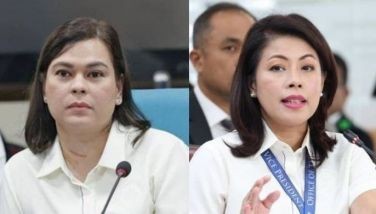EO 79: Key to responsible mining
Mahatma Gandhi once said, “Honest disagreement is often a good sign of progress.” It was true then and is definitely apt today. This is inarguably right because, more often, disagreements elicit soul searching and thought processing exercises. Collectively, through these exercises we gain better understanding and, consequently, we make sound judgments or decisions.
By going deeply, we clearly understand its positivity. However, despite the apparent healthiness in these exercises, some sectors just simply refuse to understand. Worst, some will even call for a fight if the resulting answers or solutions aren’t among those of their liking or not what they’ve expected. As there is too much democratic space in this country, cause-oriented groups and communists’ legal fronts will even try to make a show, as usual, to project an aura of piteous circumstances.
True enough, every new development presents the opportunity to disagree and provides a stage for debates. The newly issued Executive Order No. 79 (EO 79) which institutionalizes and implements reforms in the Philippine mining sector is no exception. While it is true that it provides policies and guidelines to ensure environmental protection and responsible mining in the utilization of the country’s mineral resources, some sectors are not simply taking it sitting down. Truth to tell, before it was even signed and released, shouting matches among our business leaders had already ensued.
To recall, in a Conference on Mining’s Impact on the Philippine Economy and Ecology at the Hotel Intercontinental in Makati City early this year, the disagreements among Philex Mining Corporation Chairman Manny V. Pangilinan, Chamber of Mines director Gerard Brimo and Ms. Regina Paz L. Lopez (ABS-CBN Foundation Inc.) were more pronounced. First and foremost, Ms. Lopez claimed that “mining communities were among the poorest in the country”. She further “dismissed the alleged benefits to surrounding communities where mining companies operate, saying the poorest areas in the country are mining areas”. Moreover, she (as a known environmentalist) claimed that “whether large-scale or small-scale, mining is grossly irresponsible”.
Today, as EO 79 is signed and released, the debate is uncontrollably heating up. In fact, more sectors are joining the fray. Among others, retired Lingayen-Dagupan Archbishop Emeritus Oscar Cruz in a radio interview on Radyo Veritas stressed that “Naniniwala ako na pang habol SONA lang yan”. Moreover, militants branded Malacañang's new executive order on mining as a "reaffirmation of what they called anti-people and pro-imperialist" policies contained in the Mining Act of 1995.
These sweeping pronouncements are quite uneducated. For one, to say that mining communities are among the poorest in the country is downright false. As Cebuanos, we are living witnesses of how the families in the immediate environs of the then prosperous Atlas Consolidated Mining and Development Corp. (ACMDC), now Carmen Copper Corp., lived and enjoyed abundant lives. They had several pockets of self-contained and prosperous communities. They were self-sufficient to some extent. They had a hospital and a top-of-the-line private secondary education provided by a known and highly regarded sectarian school system. Businesses do thrive too. In fact, not only was progress limited in the immediate surroundings of the mining site or Toledo, it swelled until the towns of Pinamungajan and Balamban.
On the other hand, her claim of being staunch supporter of environmental care and safety is quite questionable. First, their clan is into natural gas extraction through First Gen Corp. This is mining too in the strictest sense. Therefore, in this regard, their clan’s natural gas extraction must also be stopped and she should advise her clan to do it now to make her more credible. Moreover, it can be recalled that sometime July or August of 2010, the Lopez Group of Companies through its Chairman Emeritus Oscar Lopez (apparently, her relative) announced that the group has considered venturing into nuclear power as part of its power-generation portfolio. When asked if First Gen Corp. is open to nuclear power generation, he emphatically stressed that “it is not impossible”. In fact, he even further emphasized that the company has been doing some feasibility studies on nuclear power since 2007.
Frankly, to make Ms. Lopez take on the environmental issues about mining be more trustworthy, she should start it with her clan. Are they (the Lopez clan) willing to abandon their group’s natural gas extraction and plans for a nuclear power plant? Considering what happened to Japan a year ago, is it not more environmentally hazardous to have a nuclear power plant than having a strictly regulated mining industry?
True enough, in most natural-resources-abundant far-flung regions and provinces, the opportunities are crystal clear. Apart from the not-so-manpower oriented tourism related industry which normally thrives along beaches and shorelines, some areas that are figuratively and literally remote are richly endowed with mineral resources. Contrary to the claims of some cause-oriented groups, the government and the mining industry have until today continued to provide opportunities in the countryside.
Truth to tell, there are perceived and real downsides in mining. Mostly, these are perpetrated by irresponsible mining companies that never cared about the environment. Undeniably, however, responsible miners did not just help mitigate damaging consequences of mining but have continually poured billions of investments in the countryside. These investments not only provided employment in these areas but helped build healthy communities as well.
Due to this notable contribution of the mining operations to the economic well-being of our rural folks and its commitment to build better road network, insurgency has stopped to flourish. Unfortunately, however, due to the same contributions these responsible mining companies made, some ideologues have continued to fret. Worst, while the legal fronts (cause-oriented groups) are trying to mount their oppositions to other government sponsored poverty alleviation initiatives, their military arm (the New People’s Army or NPA) have relentlessly terrorized the mining companies. Last year, in fact, NPA attacked three mining firms in Claver, Surigao del Norte province. Apparently disadvantaged, they have to resort to these atrocities to scare away investors so these companies may stop their respective operations and they may be able to continue their recruitment activities.
As a result, not only that the mining companies lost billions in properties, thousands of workers were rendered jobless and therefore penniless as well. If not rehabilitated on time, some of these miners may just have to join the long queues of economic migrants leaving the country. Or, probably, some may just have to find their luck in the urban areas. More likely, they shall squeeze themselves through a phalanx of shanties along river banks and creeks adding to a growing population of informal settlers. Or worst, they might just help pad the already burgeoning list of criminals in highly urbanized cities.
Therefore, as we try to discern the honest intentions of EO 79 and open our eyes on the ongoing intramurals thereat, we need to understand what the very famous 12th Librarian of United States Congress, Daniel Joseph Boorstin, once wrote. That “Disagreement produces debate but dissent produces dissension. Dissent (which come from the Latin, dis and sentire) means originally to feel apart from others. People who disagree have an argument, but people who dissent have a quarrel. People may disagree and both may count themselves in the majority. But a person who dissents is by definition in a minority. A liberal society thrives on disagreement but is killed by dissension. Disagreement is the life blood of democracy, dissension is its cancer”.
Indeed, there are a lot of differing opinions. These are differing opinions that could mean diverse preferences; diverse preferences that demand tough choices; and tough choices that could even lead to personal animosities and wild altercations. In all these exercises, however, we hope that our democratic upbringing prevails and we will wholeheartedly accept this executive order that tries to strike a good balance between economic development and environmental preservation.
For your comments and suggestions, please email to [email protected].
- Latest
- Trending






















